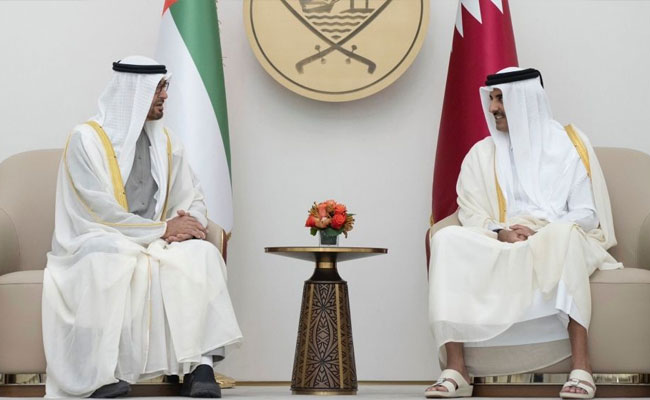Dubai (AP): The United Arab Emirates and Qatar have announced the reopening of their embassies on Monday following a yearslong rift over Qatar's support of Islamist groups.
The two countries issued statements saying the Qatari Embassy in Abu Dhabi and a Qatari Consulate in Dubai, as well as an Emirati Embassy in Qatar's capital, Doha, had resumed operations. The statements did not say if ambassadors were in place or if the missions were open to the public.
The two countries' foreign ministers spoke by phone to congratulate one another on the reopening of the diplomatic missions, Qatar said.
The UAE joined Saudi Arabia, Bahrain and Egypt in imposing a boycott and blockade of Qatar in 2017 over its support for Islamist groups across the Middle East that gained power immediately after the Arab Spring protests. The other Arab countries in the Persian Gulf view such groups as terrorists - including Egypt's Muslim Brotherhood, which won free and fair elections.
The unprecedented diplomatic crisis among the normally friendly Gulf Arab countries initially sparked fears of armed conflict. But Qatar's gas riches, and close ties to Turkey and Iran, largely insulated it from the economic sanctions, and relations slowly thawed.
The boycott was officially lifted in January 2021. Late last year, Qatar welcomed visiting leaders from Saudi Arabia, Egypt and the UAE as it hosted soccer's World Cup.
Let the Truth be known. If you read VB and like VB, please be a VB Supporter and Help us deliver the Truth to one and all.
Bengaluru: The Karnataka State Road Transport Corporation (KSRTC) has directed that all advertisements promoting the use of tobacco products, either directly or indirectly, be removed from its buses and bus stations within 15 days.
In an official release issued on Saturday, KSRTC Chief Traffic Manager (Commercial) S. Rajesh said that such advertisements should no longer be displayed on KSRTC buses, bus shelters, or at bus stations, including hoardings and glow sign boards.
The directive clearly states that no advertisements encouraging tobacco consumption, whether explicit or indirect, should be installed or exhibited on corporation property in the future.
Rajesh also instructed officials to issue notices to authorized license holders who have been permitted to install advertisement hoardings and glow sign boards at bus stations under the transport corporations. These license holders have been warned against promoting tobacco-related advertisements in any form.





